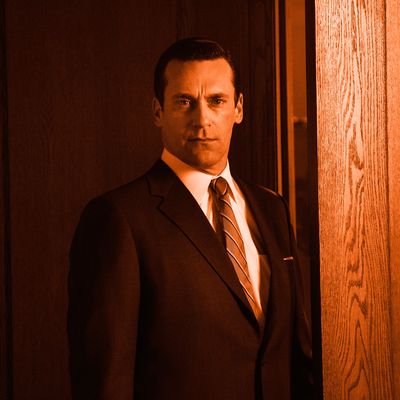
Welcome back to Stay Tuned, Vulture’s TV advice column. Each Wednesday, Margaret Lyons answers your questions about your various TV triumphs and woes. Need help? Have a theory? Want a recommendation? Submit a question! You can email staytuned@nymag.com, leave a comment, or tweet @margeincharge with the hashtag #staytuned.
I am a HUGE fan of Mad Men. My husband stopped watching after season one (although I don’t remember him watching more than two episodes) because he found Don Draper to be unlikable and his behavior indefensible. I accepted that reason at the time because we, the viewers, didn’t know Don’s story at that point, but as the series continued, I grew to understand Don and the rest of the characters to the point where I’m really attached to them!
Unfortunately, my husband does not have the benefit of additional seasons and still believes that Don is a horrible person, and he can’t watch the show beyond that. We have argued about this point over and over again, and I get unreasonably angry, however … my husband is totally wrong, right? What point can I bring up the next time we argue about Mad Men that will impress upon him how Don isn’t such a horrible person and/or that Mad Men is more than Don’s story? Why do people (me) get so attached to TV characters that we’re willing to defend them as if they are real? —Vanessa
I have good news and bad news for you, Vanessa. I agree with your general take here, that the show is about much more than Don, and that over the series, one grows attached to these people. I certainly did. But are you really arguing that Don’s not a horrible person? Don … is a horrible person. I still love Mad Men, I am still enthralled by it, and there’s no show I’d rather think about, talk about, or write about. But come on. The guy is a monster. He’s other things, too, but he’s definitely a bad dude. I think your husband should watch Mad Men because I think it’s the greatest show of our time, not because I think Don Draper’s an undercover sweetheart.
I’m not mystified by Don’s behavior. We’ve gotten plenty — I’d even say maybe a little too much — backstory to justify his warped, unkind, dishonest actions, but explaining behavior is not the same as excusing it. I wouldn’t want to be married to him. I don’t even think I could be friends with him. He’s mean and vindictive, scarily impervious to affection, and I’d always wonder if he was about to vanish. He’s unpredictable, he struggles with substance abuse, he’s a womanizer, and he does not respond well to crying. (I’m a big crier; this would be a huge issue for me.) Just about everyone on Mad Men is some kind of terrible, really. Peggy’s self-absorbed. Pete’s a rapist. Roger is callous. I think Joan is one of the most fascinating characters on television, but she’s also incredibly nasty, and like I said, I’m a crier, so.
Luckily, the traits that make someone a worthy TV character are not synonymous with the traits that make someone a decent human. I want to watch shows about characters who are interesting and specific, who see the world in distinctive ways. I like when characters articulate or embody aspects of the human condition that I don’t often consider, and I also like when I see parts of myself and my experiences reflected back to me in ways that are illuminating or validating. Goodness or ethics or decency can be interesting to watch, but they’re not requirements.
Why do people form strong bonds to characters as if they were real people, you ask. Gosh, why do we form bonds to real people as if they’re beloved characters? Real people are disgusting and horrible, but Toby Ziegler never secretly shit-talked me, and Carol Hathaway was never 20 minutes late every single time we were supposed to hang out like, 100 times, and Liz Lemon didn’t marry the Beeper King. In real life, people decide how much of themselves to reveal, but characters don’t make those same decisions. If I knew Cersei Lannister, I’d just think she was a spoiled, cruel wino, because of course she’s not walking around saying, “I live in a family that supports incest, and while I think of myself as taking after my father, that’s actually a bad thing.” But she’s a character, so we have access to that, and the more you know about someone’s heaviest burdens, the easier it is to feel compassion for them.
Which brings us back to Don. I have compassion for Don Draper, and I am interested in what his character suggests about how we craft identity. The next time your husband says he doesn’t want to watch Mad Men because Don is so bad, remind him that we’re all bad, and we all do lousy things sometimes, and that portraying emotional depravity isn’t the same thing as approving of it. Tell him that Don’s bad qualities are rooted in authentic character development, but they’re also there to remind us of the failures of postwar American culture that told people patriotism, consumerism, and determination were the keys to happiness. Don’s a veteran and a salesman and no one ever tells him no, and yet he’s emotionally empty and overwhelmingly desperate. Of all the shows the are about damaged and dangerous people, Mad Men is the most adamant about portraying the downsides of being an antihero — sure, you get to bone a lot, but man, the bankruptcy of spirit will really bring you down! Finally, tell your husband that if he’s only going to watch shows about good people, he’s not going to have very many options.




